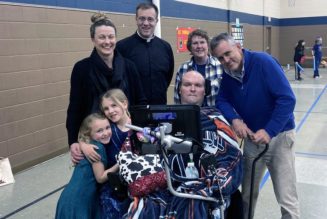
St. Philip Neri (Giandomenico Tiepolo, Oratory of the Crucifix, Church of San Polo, Venice)
In these days between the two great solemnities of the Ascension and Pentecost, the Church holds its breath in anticipation—an anticipation greater than any except Holy Saturday and the Easter Vigil.
What we look forward to is the great gift of the Holy Spirit and the birthday of the Church as we know it. The sacraments, the priesthood, the apostolic succession of bishops, the papacy, the magisterial teaching authority, the transmission and development of sacred doctrine — all this depends on the gift of the Holy Spirit.
So what we look forward to in Pentecost is a beginning. But in our readings today our Lord and St. Paul are each contemplating endings: “finishing my course” in the words of St. Paul; “accomplishing the work you that you gave me to do” in the words of our Lord.
Jesus’ mortal life as he prays this high-priestly prayer is measured in hours. St. Paul will shortly be arrested and taken in chains to Rome, where he will eventually be martyred.
What matters to our Lord and to St. Paul, though, is that they have finished their course, accomplished the work the Father gave them to do.
Each of us has a course to run, a work that has been given to us that we must do, not just for human beings, but for our Father. That is why each of us is here. I’m sure some of you are familiar with the much-quoted words of a prayer by St. John Henry Newman, the great English convert and theologian:
God has created me to do Him some definite service.
He has committed some work to me
which He has not committed to another.
And the same is true of each of us.
This thought unfortunately leads some to scrupulous anxiety and even paralysis about making decisions, lest we choose wrong and miss forever the work that has been committed to us.
This job seems like a good opportunity, but what if it’s not God’s will? Here’s a person I really like and might want to marry, but what if God wants me to marry someone else? Am I really called to the priesthood or the diaconate or religious life? What if I make a mistake?
This whole way of thinking is misguided. Very few of us get heavenly annunciations or Damascus road appearances spelling out our life’s work. Most of us will find our path clear enough day by day if we focus on loving God and loving our neighbor, keeping the commandments, and practicing the virtues, especially the virtue of prudence, of good decision-making, which includes seeking advice from people we trust.
Take our saint we remember today, Philip Neri, who did have a mystical experience that changed the course of his life. We call Philip the Apostle of Rome. He went to Rome and at first devoted himself to studying, writing, and working as a tutor, fasting and praying all the time. Then when he got bored of study he sold his books, gave the money to the poor, and began visiting the sick in hospitals and encouraging others to join him — all this as a layman for 17 years.
Then finally a confessor set out to persuade him to become a priest. And at first Philip had all sorts of objections to this — didn’t think he was worthy; he had had a vision! he felt called to serve as a layman! — and his confessor was like, “Good humility, but no.” And Philip was humble enough to trust his confessor’s judgment more than his, and he became a priest. No scrupulous anxiety, no paralysis.
So often this is how the Holy Spirit works in our lives. Not necessarily by dramatic experiences or interior locutions, but in advice from people we trust, in not being overly attached to our own ideas about how our life should go, in recognizing that whatever God asked of us yesterday, tomorrow he may ask something completely different.
This was something Cardinal Newman knew well. It’s in the words of a hymn he wrote — “Lead, Kindly Light” — but it’s also in the words of that prayer I referred to before, not all of which may be as familiar as the opening lines. Here’s the whole thing.
God knows me and calls me by my name.…
God has created me to do Him some definite service;
He has committed some work to me
which He has not committed to another.
I have my mission—I never may know it in this life,
but I shall be told it in the next.Somehow I am necessary for His purposes …
I have a part in this great work;
I am a link in a chain, a bond of connection
between persons.
He has not created me for naught. I shall do good,
I shall do His work;
I shall be an angel of peace, a preacher of truth
in my own place, while not intending it,
if I do but keep His commandments
and serve Him in my calling.Therefore I will trust Him.
Whatever, wherever I am,
I can never be thrown away.
If I am in sickness, my sickness may serve Him;
In perplexity, my perplexity may serve Him;
If I am in sorrow, my sorrow may serve Him.
My sickness, or perplexity, or sorrow may be
necessary causes of some great end,
which is quite beyond us.
He does nothing in vain; He may prolong my life,
He may shorten it;
He knows what He is about.
He may take away my friends,
He may throw me among strangers,
He may make me feel desolate,
make my spirits sink, hide the future from me—
still He knows what He is about.…
Let me be Thy blind instrument. I ask not to see—
I ask not to know—I ask simply to be used.









